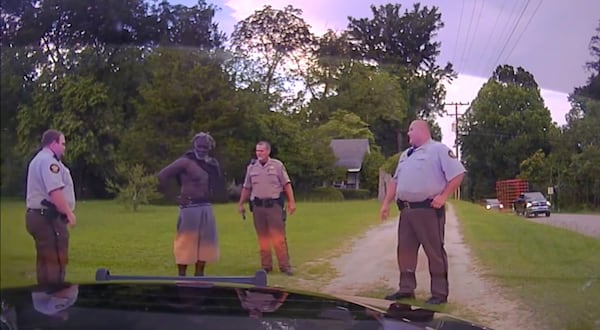Eurie Martin walked down Deepstep Road in rural central Georgia to visit his sister. He never made it to her front door in Sandersville.
The July heat drew Martin up an unfamiliar driveway in search of water. Martin was a big man, standing 6-feet tall and weighing 235 pounds. That day he had taken off his shirt and tied it over his shoulders. The homeowner said Martin looked “filthy” and refused him a drink before ordering him off his property. As Martin, 58, walked away, the homeowner dialed 911 and reported him as a suspicious man, according to court records.
A Washington County deputy soon pulled his cruiser alongside Martin, who is Black, but Martin ignored him and kept walking straight ahead on the side of the road. Three white deputies exited their cruisers and surrounded Martin, shocked him repeatedly with Tasers, and restrained him on the ground by kneeling on his back and legs. A first responder found Martin had no pulse and started CPR. Martin died at the scene.
Martin was unarmed when deputies accused him of walking in the roadway in an area where there is no sidewalk. The NAACP decried Martin’s death at the time as a crime of “walking while Black.”
“Certain members of the community are treated differently by the police,” NAACP President Gerald Griggs said recently. “They are seen as suspects, and one of the potential crimes in walking in any neighborhood is to be a Black person.”
Martin’s death remains a stain on the small, majority-Black community of Washington County that is home to fewer than 20,000 people. In 2021, a hung jury was unable to reach a unanimous verdict on the murder charge. A new trial is set to start Monday when a jury will be selected to hear the case in the red-brick courthouse on the Sandersville town square. The officers face multiple charges, including false imprisonment, aggravated assault, involuntary manslaughter and murder, which carries a maximum of life in prison.
Henry Lee Copeland, Michael Howell and Rhett Scott were fired by the Washington County Sheriff’s Office based on findings that they “carelessly escalated” their response and violated agency procedures, records show.
None of the men responded to requests for comment sent to them and their criminal defense lawyers. In court documents, the men said they acted lawfully. They also said they had acted in self-defense, but that claim was thrown out before the start of the trial. Whether they are appealing their terminations could not be immediately determined.
“What happened to Eurie did not have to happen. It should not have happened the way it did,” said Martin’s sister, Helen Gilbert.
A suspicious person
July 7, 2017, dawned hot and humid, the kind of weather that brewed early evening thunderstorms. All afternoon the temperature hovered in the low 90s as Martin walked many miles toward his sister’s home in Sandersville.
Single family homes dot Deepstep Road with lawns that grow up to the edge of the two-lane roadway, and there are no sidewalks.
Martin was walking along the edge of the road when Howell’s cruiser pulled alongside him.
“Are you okay?” Howell called out the passenger side window, he later wrote in a report. “What’s your name?”
Martin looked at the deputy and responded, “Who are you?” and just kept on walking.
It was after 7 p.m. and Howell was responding to a report of a suspicious person: Black male, wearing shorts and walking on Deepstep toward Sandersville.
The Washington County Sheriff’s Office gets multiple suspicious person calls a week to check out people walking on the road or cars parked in yards or churches, Chief Deputy Mark McGraw testified in the first trial.
As Copeland’s vehicle pulled in front of Martin, he crossed the street to get away from the deputies, video shows. Martin can be heard telling the deputies, “Leave me alone,” as they order him to get off the street. “I ain’t messin’ with you man” and “I ain’t did nothing.” As Martin walked farther up the street, Copeland repeatedly commanded him to stop and put his hands behind his back as Howell called out, “Tase his ass.”
Credit: GBP News
Credit: GBP News
Keldrick Wiley-Johnson was driving back from Atlanta with a few guys from a landscaping job when they came on Martin and the deputies. One of the deputies pulled a Taser from his belt, and a guy in the vehicle began recording with his phone.
“I could tell he really didn’t understand what they were saying, like he needed a little help. He didn’t understand what they were trying to do,” Wiley-Johnson testified.
The men watched as Martin was shocked by the Taser, fell to the ground and then stood up to walk away from the deputies.
Howell testified during the first trial that Martin looked like he was going to swing at the deputies.
“It wasn’t that he was hitting us with closed fist, I referred to it as him resisting us. He wasn’t complying with our verbal commands given to him,” Howell testified.
As Martin rounded the corner, Scott pulled his vehicle in front of Martin to block his path and within 30 seconds pulled the trigger of his Taser to shock Martin again, video shows. Martin tried to pull the electrical probes off his skin.
Across the street, the blue lights of the cruisers flashed in Lee Curtis Bentley’s living room, where he and his wife were watching TV. They stood at their window and watched the deputies approach Martin.
“There were officers wrestling with a guy and then (they) finally got him on the ground,” Bentley testified.
Then the deputies “knelt down on (Martin’s) shoulders and head and another one got down on his feet and legs and then the third was in the middle,” he added.
The couple opened the living room window and heard the deputies yelling instructions at Martin to “pull your arm out” from under himself. Martin was face down on the ground as the deputies knelt on him and handcuffed him.
At the first trial, Bentley told the jury he was struck by what he saw: “After a while, they just stopped and stood up, and the middle guy went back to the car and the other two just stood there. But, you know, the man laid there on the ground. And my wife says to me, ‘They didn’t kill him.’ I said, ‘No, they wouldn’t kill him.’ But he was dead.”
The life and death of Eurie Martin
Martin and his eight siblings grew up in Sandersville, where he attended high school and played football.
Martin’s high school graduation photo shows him dressed in a crisp white collared shirt and black tie. His jaw is stubbled with a new beard and his curls puff out to either side of the graduation cap and tassel. He is looking away from the camera, off into the distance.
Early in adulthood, Martin was diagnosed with schizophrenia, his sister, Helen Gilbert, told the AJC. In 2017, he was living in a group home in nearby Milledgeville. He often walked several dozen miles to Sandersville to visit with Gilbert. Martin kept to himself, but he was a frequent visitor at family functions and barbecues, Gilbert said.
Martin appears confused by the deputies, said Gilbert, who has seen videos of the arrest. She is angry the deputies didn’t ask Martin where he was going or if he needed water.
“There’s no crime in walking while Black,” Gilbert said. “We are all free to walk. There’s no crime in walking.”
Video shows Martin face down on the grass even as the deputies begin to question if he is breathing. What frustrates Gilbert the most, she said, is the deputies were talking to each other on how to charge Martin rather than administering life-saving help before the ambulance arrived.
A Sandersville police officer who arrived while Martin was prone on the ground recommended he be rolled off his stomach. The officer had recently completed training on the topic.
“I had just learned that … once you handcuff somebody, it’s always a good idea to roll them off their stomach just so they don’t, you know, suffocate,” testified the officer, who was not charged in this incident.
A part-time firefighter who was called in to help lift Martin into an ambulance was one of the first people to realize Martin’s chest wasn’t rising or falling, he testified. He shined a flashlight in Martin’s eyes and the pupils didn’t react, which in his experience meant there was no brain activity.
Martin had no pulse, 911 records show.
First responders removed the handcuffs and did CPR until a doctor told them to quit.
Keith Lehman, a medical examiner with the Georgia Bureau of Investigation, did the autopsy on Martin and concluded he died while being restrained by police because of an irregular heartbeat, which had been caused by the stress of Martin’s physical altercation with the deputies. Martin’s blood showed no illicit drugs or alcohol.
Lehman said there was no evidence the deputies had cut off blood to Martin’s head or put enough pressure on his chest to prevent him from breathing. Still, Lehman testified, the deputies caused Martin’s death, which he determined was a homicide.
“The reason why I don’t call these accidental death is because the application of force in a case like this is not accidental. The application of force is intentional,” Lehman testified.
Deputies say force was reasonable
Howell was a part-time deputy with two decades of law enforcement experience when he approached Martin in July 2017. Scott had been working as a deputy for less than three years, licensing records show.
When Copeland arrived to Deepstep Road, both deputies became his responsibility. As a sergeant with nine years of experience with the department, Copeland was the highest ranked officer, and it was his job to ensure Howell and Scott followed the agencies’ rules.
Officers can detain a person for a field interview, but if no crime has been committed that person can walk away, Washington County Deputy Trey Burgamy testified.
Credit: WJBF-TV
Credit: WJBF-TV
Howell and Scott had previously worked as jailors, which may have affected how they approached Martin, said Francys Johnson, a lawyer representing Martin’s family in a separate civil rights lawsuit.
“They didn’t make the switch in their minds about the different constitutional standard of giving a command to someone who they supervise in the context of the Department of Corrections versus someone that they encountered on a public roadway,” Johnson said. “Mr. Martin didn’t have to obey any of their commands and could legally walk away.”
After the incident, the deputies alleged Martin had broken the law by walking in the road.
But an internal investigation that resulted in their firing concluded Martin was not in the road. “Specifically, nothing articulated in Deputy Howell’s report supports the premise that Mr. Martin was walking in the roadway,” the investigation found. It also concluded that Martin’s behavior was not suspicious or criminal.
“The deputies carelessly escalated a welfare check into a needless physical altercation culminating in Mr. Martin being tasered,” the investigation found. They also didn’t provide first aid as they had been taught, and Copeland, the ranking officer at the scene, had failed to take control.
Howell, Scott and Copeland were fired and their law enforcement licenses are suspended. Shortly after, they were indicted by a grand jury.
Experts testified for the defense at the trial in 2021 that the deputies’ use of force on Martin was reasonable, because Martin was not obeying commands and had pulled the probes of an officer’s Taser off his body. An emergency medicine doctor also testified in their defense that how Martin looked and acted reasonably raised red flags for the officers to continue to engage with him.
‘Put it to rest’
Hayward Altman grew up in Folkston, more simply called “the swamp” because of its proximity to the Okefenokee National Wildlife Refuge in the southeast corner of the state. He moved to Middle Georgia and spent 12 years as the elected district attorney.
Altman had more than 70 murder trials during a 30 year career with the district attorney’s office for the Middle Judicial Circuit of Candler, Emanuel, Jefferson Toombs and Washington counties. He took a narrow view of when to criminally charge police officers and specifically recalls not charging a deputy who shot a man who came at him with a knife. To this day he supports “qualified immunity,” which broadly shields officers from criminal prosecution for taking actions to protect themselves and others.
Martin’s death was different, because the deputies were clearly not defending themselves or anyone else, Altman said. Before the year’s end he indicted Howell, Scott and Copeland on murder charges.
“I had people upset with me,” Altman said. “That was not my job. My job, at the time, was to make a decision that was based on what I believed needed to be done.”
He tried to move the case along quickly, but it hit bumps along the way. The first indictment was tossed out, because the deputies had not been given a chance to testify to the grand jury. Another grand jury quickly reindicted them only to have a judge say the officers acted in self-defense and were immune from prosecution. The Supreme Court disagreed and sent the case back to Washington County for trial.
By then it was 2020 and the COVID-19 pandemic had hit. Altman’s wife had also been diagnosed with terminal breast cancer, but he felt a dedication to getting justice for Martin and she encouraged him to keep working. She died three months before the trial started in 2021.
The six-day proceeding ended in a mistrial when the jury could not reach a unanimous verdict. The case was voluntarily transferred to the Chattahoochee Judicial Circuit and will be tried by Assistant District Attorney George Lipscomb in Sandersville starting Monday.
Altman, 73, is now retired and no longer involved in the case. He said he would make the same decision today as he did in 2017 to charge the deputies.
Race could have been a factor in Martin’s death, he said.
“When you’re dealing with a situation like that, there’s always going to be the suspicion that race may have factored in. You can’t remove that in any situation,” Altman said.
Credit: Miguel Martinez-Jimenez
Credit: Miguel Martinez-Jimenez
Washington County Sheriff Thomas Smith called Altman the night of Martin’s death. Altman said he remembers making the hour and 15-minute drive and visiting the scene the following day. The GBI was already collecting evidence. Martin’s body had been taken away.
Soon after, Altman advised the sheriff to improve his officers’ training, he said. The Washington County Sheriff’s Office now requires a 40-hour crisis intervention course for dealing with mental illness.
Sheriff Joel Cochran now runs the agency. He did not respond to multiple interview requests from the AJC. Smith died of a self-inflicted gunshot wound in 2019.
It would be good for the community if there were a resolution to Martin’s case, Altman said.
“The fact that it’s going back to trial after a hung jury, even though it’s been eight years, that in itself is justice, because it needs to be resolved so the people in Washington County, the family of Eurie Martin and even the family of the defendants can all put it to rest,” Altman said.
Waiting for her brother
A summer thunderstorm rolled through Washington County on the evening of July 7, 2017.
It was around that time that Gilbert received an unexpected call from her sister-in-law. Family members had seen Martin walking toward Sandersville earlier that day, she reported. But Martin had never arrived, and now it was dark and storming. Concern filled her.
Gilbert dialed 911 and requested a welfare check on her brother.
As she placed the call, she didn’t know the rain and high winds were keeping a helicopter from getting to her brother as he lay unresponsive on Deepstep Road.
The following morning a victim’s advocate knocked on her door and delivered the news: Martin was dead. Gilbert could see the words coming out the man’s mouth, but she didn’t believe them. Over time it sunk in that her brother’s death was real and not make-believe, she said.
Credit: Miguel Martinez-Jimenez
Credit: Miguel Martinez-Jimenez
Nothing has been the same since that day, Gilbert said. There are no more surprise visits to look forward to or chats about high school with her brother. The family of nine has dwindled to just five living siblings.
Gilbert said she takes no pleasure in what may happen at the upcoming trial, but it is a chance for closure eight years later.
“Sometimes you just can’t say what justice looks like,” Gilbert said, “But there is a feeling of relief.”
About the Author
Keep Reading
The Latest
Featured





